|
|
|
Sort Order |
|
|
|
Items / Page
|
|
|
|
|
|
|
| Srl | Item |
| 1 |
ID:
144684
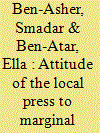

|
|
|
|
|
| Summary/Abstract |
This article examines the 2001‒2003 coverage by the local press in the Haifa region of the struggle of the fishermen who claimed to have contracted cancer as a result of coming into contact with the polluted water of the Kishon River. It shows that the local press chose to deliver to its readers an ‘interpretive package’ that portrays the fishermen as ‘The River’s Heroes’, a group fighting for justice and morality for the benefit of all. However, alongside the favourable framing were also some of the writers’ stereotypical elitist perceptions, at times explicit and at others implicit, of the fishermen. In the case of the Kishon fishermen, whereas the local press played an important role in covering their struggle, it only partially presented the solidarity dimension wherein the differences between people and groups constitutes the basis for moral relations between them.
|
|
|
|
|
|
|
|
|
|
|
|
|
|
|
|
| 2 |
ID:
116552
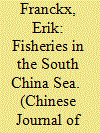

|
|
|
|
|
| Publication |
2012.
|
| Summary/Abstract |
The present paper intends to have a look at fisheries in the South China Sea in order to find out whether this particular issue is a problem solver or rather a problem creator in this region characterized by tense inter-State relationships at present. In this part of the world's ocean, dominated by maritime features such as the Paracels and the Spratleys, i.e. shallow areas, sometimes drying only at low tide, and sometimes at high tide as well, fish is a plentiful resource relied upon by many fishermen of the surrounding countries as a source of income. If we take Europe as an example, fisheries seem to have the dual capability to either trigger disputes between States, resulting sometimes in outright fish wars, or to provide a means of furthering integration between States, such as has been accomplished by the European Common Fisheries Policy. In the South China Sea a similar duality can be witnessed. At times, fishermen have dramatically influenced the relations between certain States to the point of suddenly straining diplomatic relations totally disproportionately to the event which had triggered a particular incident. But fisheries are also used as a vehicle for trying to further co-operation on both bilateral and regional levels. Indeed, very often fisheries are seen as a more "neutral" area able to stimulate co-operation more easily than, for instance, co-operation in the military field or on sovereignty-related issues. This paper will conclude by determining whether Article 123 of the 1982 United Nations Convention on the Law of the Sea adds any legal obligation to the riparian States of a semi-enclosed sea in this respect.
|
|
|
|
|
|
|
|
|
|
|
|
|
|
|
|
| 3 |
ID:
146382


|
|
|
| 4 |
ID:
168566
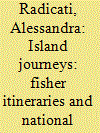

|
|
|
|
|
| Summary/Abstract |
This paper explores questions of mobility, ethnicity and spatial imaginaries in Sri Lanka through the experiences of fishermen in Mutuwall, a neighborhood of Colombo. While scholars of Sri Lanka have explored the historically contingent nature of Sri Lanka’s island-identity, this paper engages with the contemporary construction of island-ness through ethnographic fieldwork with twenty-first century residents of the city. Through fishers’ accounts of their pre-war itinerant lifestyles and their experiences living in the coastal High Security Zone during the civil conflict, this essay juxtaposes the free movement of fishers before the war with the heavily restricted movement they experienced at the height of the tensions between the Sri Lankan state and the Liberation Tigers of Tamil Eelam. Fisher itineraries can be understood as dovetailing with state imaginaries of island-wide sovereignty even as they challenge it by describing subaltern movement through space. Ultimately, this paper suggests the importance of contemporary modes of ‘doing’ Indian Ocean studies.
|
|
|
|
|
|
|
|
|
|
|
|
|
|
|
|
| 5 |
ID:
149170
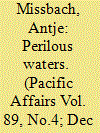

|
|
|
|
|
| Summary/Abstract |
Recent research has found that since 2001 a disproportionate number of Indonesian offenders sentenced to jail for people smuggling, both in Indonesia and Australia, are fishermen from Eastern Indonesia, the poorest part of the country.2 Based on three field trips to the Eastern Indonesian island of Rote, a frequent departure point for asylum seekers to Australia, and semi-structured interviews, this article investigates the socio-economic backgrounds of sentenced offenders from this area to explain their high numbers amongst imprisoned people smugglers. Through the narratives of fishermen who have been involved in the transport of asylum seekers, this article seeks to reconstruct their decision-making and risk-taking strategies in light of their generally precarious lives. Their motivations to become involved in people issue_images_89_4_missbach_rote-island-2smuggling are correlated with two structural problems they face, overfishing and pollution, which have exacerbated their economic situation over the last years. Understanding the local structural constraints of these impoverished fishermen helps provide a clearer understanding of why and how transnational people-smuggling networks succeed in recruiting them. Rather than viewing the decision to become involved in people smuggling as an individual’s poor judgement and its negative outcome as self-inflicted misery, this article stresses the notion of collective hyper-precariousness, which is enhanced by extrinsic factors such as Australian policies that have further limited the meagre choices for making a living legally on Rote
|
|
|
|
|
|
|
|
|
|
|
|
|
|
|
|
| 6 |
ID:
106771
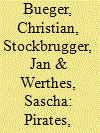

|
|
|
|
|
| Publication |
2011.
|
| Summary/Abstract |
The dominant approach to counter-piracy strategy off Somalia is astonishingly narrow-minded. Deterrence, surveillance and military operations do not provide sustainable or efficient solutions; better strategic alternatives must draw on the lessons of 21st-century peace operations. This perspective leads to an understanding of counterpiracy as a problem of peacebuilding. This allows restructuring and reframing of the problem to permit a much wider repertoire of policy solutions than is currently conceived. This repertoire may include development and security assistance programmes as well as state-building programmes. The approach also permits integration of lessons learned in the frame of international peacebuilding operations, including avoiding technocratic solutions, focusing on power constellations, integrating local knowledge and incrementalism. If the international community wishes to take piracy seriously and respond to its complexities, it would be well advised to adopt a policy in which such alternatives are considered.
|
|
|
|
|
|
|
|
|
|
|
|
|
|
|
|
|
|
|
|
|